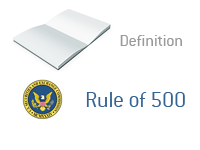Definition of Rule of 500
What is the "rule of 500" as it applies to the stock market? What does the term "rule of 500" mean?
When it comes to the stock market, the "rule of 500" refers to a SEC (Securities and Exchange Commission) rule that generally requires companies with 500 shareholders or more and at least $10 million in assets to start publicly disclosing their financial data.
 You normally hear about the "rule of 500" when a very visible privately held company with at least $10 million in assets decides to finally offer shares to the public (Initial Public Offering). The company normally has its hand forced due to the 500 shareholder rule.
You normally hear about the "rule of 500" when a very visible privately held company with at least $10 million in assets decides to finally offer shares to the public (Initial Public Offering). The company normally has its hand forced due to the 500 shareholder rule. An example of the 500 shareholder rule resulting in a company choosing to go public? Facebook. Facebook has generated a phenomenal amount of interest over the past couple of years, and they are expected to top the 500 shareholder mark by the end of 2011. For this reason, the company is expected to go public in early 2012.
The SEC is apparently contemplating relaxing the 500 shareholder rule.
--
Davemanuel.com Articles That Mention Rule of 500:
None
